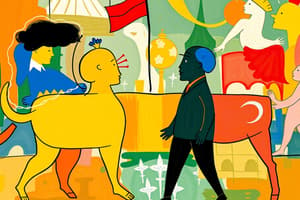Podcast
Questions and Answers
What branch of political science focuses on the implementation of government policy?
What branch of political science focuses on the implementation of government policy?
- Public Law
- Public Administration (correct)
- Political Theory
- Comparative Politics
Which political system involves citizens voting directly on issues?
Which political system involves citizens voting directly on issues?
- Monarchy
- Representative Democracy
- Totalitarianism
- Direct Democracy (correct)
What is the term that refers to the legitimate power recognized by society?
What is the term that refers to the legitimate power recognized by society?
- Sovereignty
- Authority (correct)
- State
- Power
Which ideology advocates for tradition and social stability?
Which ideology advocates for tradition and social stability?
What defines a state in political terms?
What defines a state in political terms?
What is political socialization?
What is political socialization?
Which of the following best describes authoritarianism?
Which of the following best describes authoritarianism?
What characterizes totalitarianism?
What characterizes totalitarianism?
Flashcards are hidden until you start studying
Study Notes
Overview of Political Science
- Definition: The study of politics, government systems, and political behavior.
- Branches:
- Comparative Politics: Studies and compares political systems.
- International Relations: Examines relationships between countries.
- Political Theory: Analyzes political ideas and philosophies.
- Public Administration: Focuses on the implementation of government policy.
- Public Law: Studies the legal aspects of government and politics.
Key Concepts
- Power: The ability to influence or control the behavior of people and institutions.
- Authority: The legitimate power recognized by society or a group.
- Sovereignty: The authority of a state to govern itself or another state.
- State: A political entity with a defined territory, population, government, and sovereignty.
- Nation vs. State: A nation is a group of people with a common identity; a state is a political entity.
Political Systems
- Democracy: Government by the people, typically through elected representatives.
- Direct Democracy: Citizens vote on issues directly.
- Representative Democracy: Elected officials represent the interests of citizens.
- Authoritarianism: Concentration of power in a leader or an elite not accountable to the public.
- Totalitarianism: An extreme version of authoritarianism where the state seeks to control all aspects of life.
- Monarchy: Rule by a king or queen, can be absolute or constitutional.
Political Ideologies
- Liberalism: Emphasizes individual freedoms, democracy, and the protection of human rights.
- Conservatism: Advocates for tradition, social stability, and maintaining established institutions.
- Socialism: Promotes social ownership and democratic control of the means of production.
- Fascism: A far-right ideology characterized by dictatorial power, centralized control, and suppression of opposition.
Political Behavior
- Political Participation: Involvement in activities aimed at influencing government policy.
- Voting, campaigning, protests, and civic engagement.
- Public Opinion: The collective attitudes and beliefs of individuals on political issues.
- Political Socialization: The process through which individuals acquire their political beliefs and values.
Institutions
- Legislature: Body responsible for making laws (e.g., Congress, Parliament).
- Executive: Branch that implements and enforces laws (e.g., President, Prime Minister).
- Judiciary: System of courts that interprets laws and settles disputes.
International Political Systems
- United Nations: An international organization aimed at fostering global cooperation and peace.
- International Treaties: Agreements between countries that govern their relations.
- Globalization: The process of interaction and integration among people, companies, and governments worldwide.
Current Trends
- Populism: Political approach that seeks to represent the interests of ordinary people.
- Nationalism: Strong identification with one's own nation, often placing its interests above others.
- Environmental Politics: Growing focus on policies addressing climate change and sustainability.
Overview of Political Science
- Political science studies politics, government systems, and political behavior.
- Branches include Comparative Politics, International Relations, Political Theory, Public Administration, and Public Law.
Key Concepts
- Power: Influencing or controlling behavior in individuals and institutions.
- Authority: Legitimate power recognized by society.
- Sovereignty: A state's authority to govern itself and others.
- State: A defined political entity with territory, population, government, and sovereignty.
- Nation vs. State: A nation is a group with a shared identity; a state is a governance structure.
Political Systems
- Democracy: A system of government by the populace, usually through representatives.
- Direct Democracy: Citizens vote on issues directly.
- Representative Democracy: Elected officials advocate for citizens' interests.
- Authoritarianism: Power concentrated in unaccountable leaders or elites.
- Totalitarianism: Extreme authoritarianism where the state controls all life aspects.
- Monarchy: Rule by a king or queen, categorized as absolute or constitutional.
Political Ideologies
- Liberalism: Focuses on individual freedoms, democracy, and human rights.
- Conservatism: Values tradition, social stability, and established institutions.
- Socialism: Advocates for social ownership and democratic means of production control.
- Fascism: A far-right ideology characterized by dictatorial power and opposition suppression.
Political Behavior
- Political Participation: Engaging in activities that influence government policy, including voting, campaigning, and protests.
- Public Opinion: Collective viewpoints of individuals on political matters.
- Political Socialization: The process by which individuals form their political beliefs and values.
Institutions
- Legislature: Responsible for law-making (e.g., Congress, Parliament).
- Executive: Implements and enforces laws (e.g., President, Prime Minister).
- Judiciary: Courts that interpret laws and resolve disputes.
International Political Systems
- United Nations: International body promoting global cooperation and peace.
- International Treaties: Formal agreements governing relations between countries.
- Globalization: Interaction and integration among global populations, companies, and governments.
Current Trends
- Populism: Political ideology representing the interests of the common people.
- Nationalism: Strong allegiance to one's nation, prioritizing its interests.
- Environmental Politics: Increased focus on climate policies and sustainability measures.
Studying That Suits You
Use AI to generate personalized quizzes and flashcards to suit your learning preferences.




